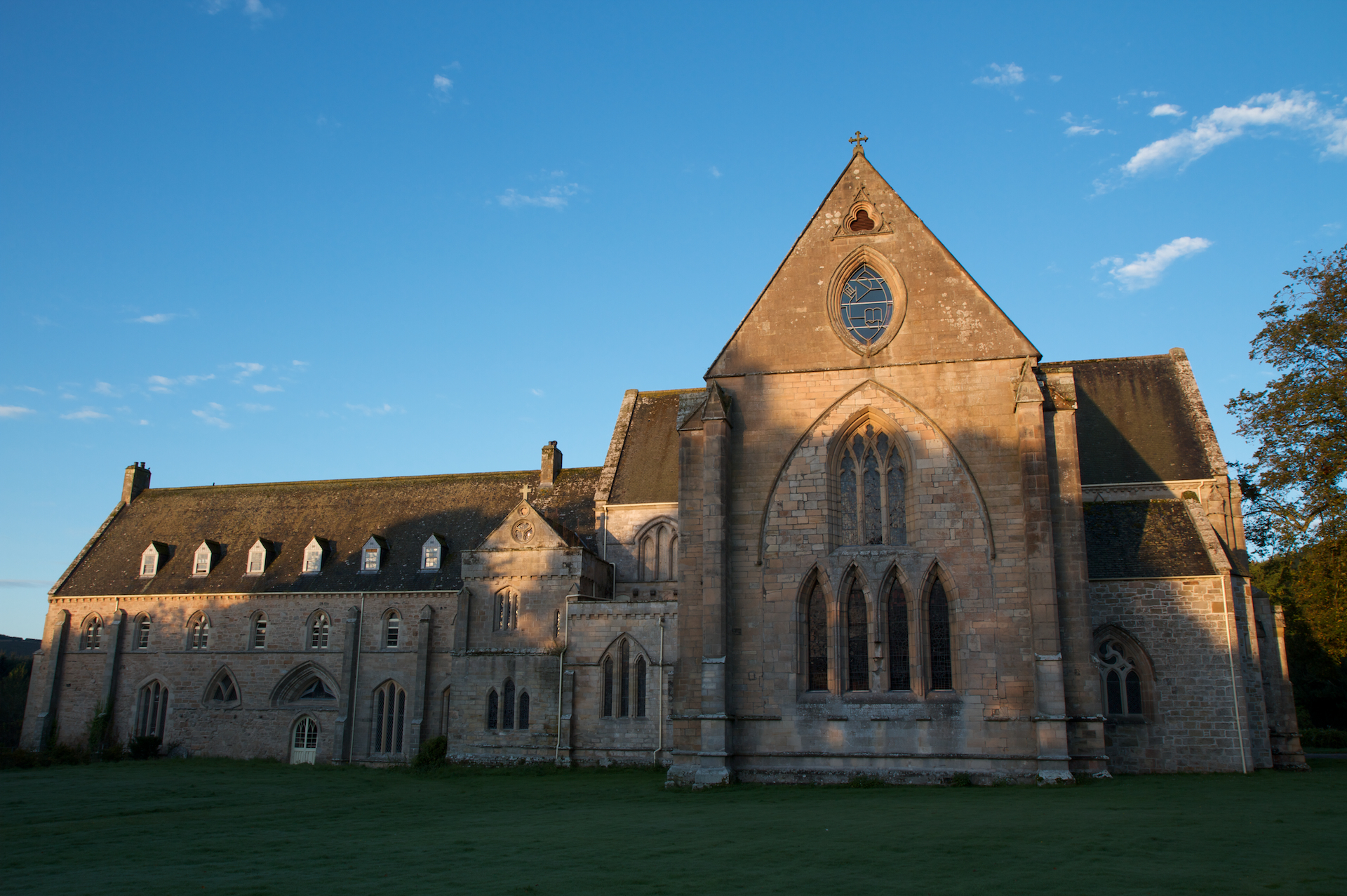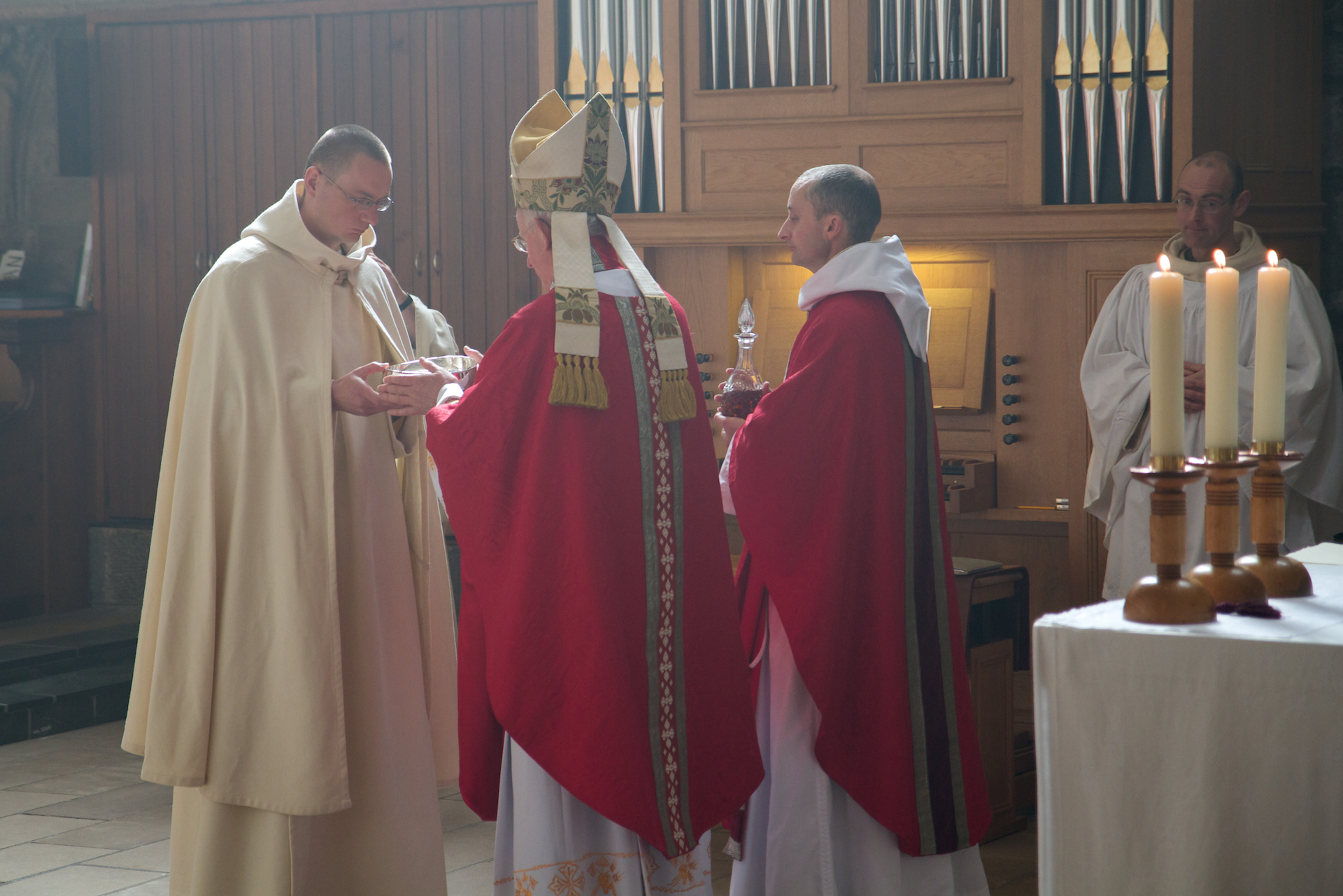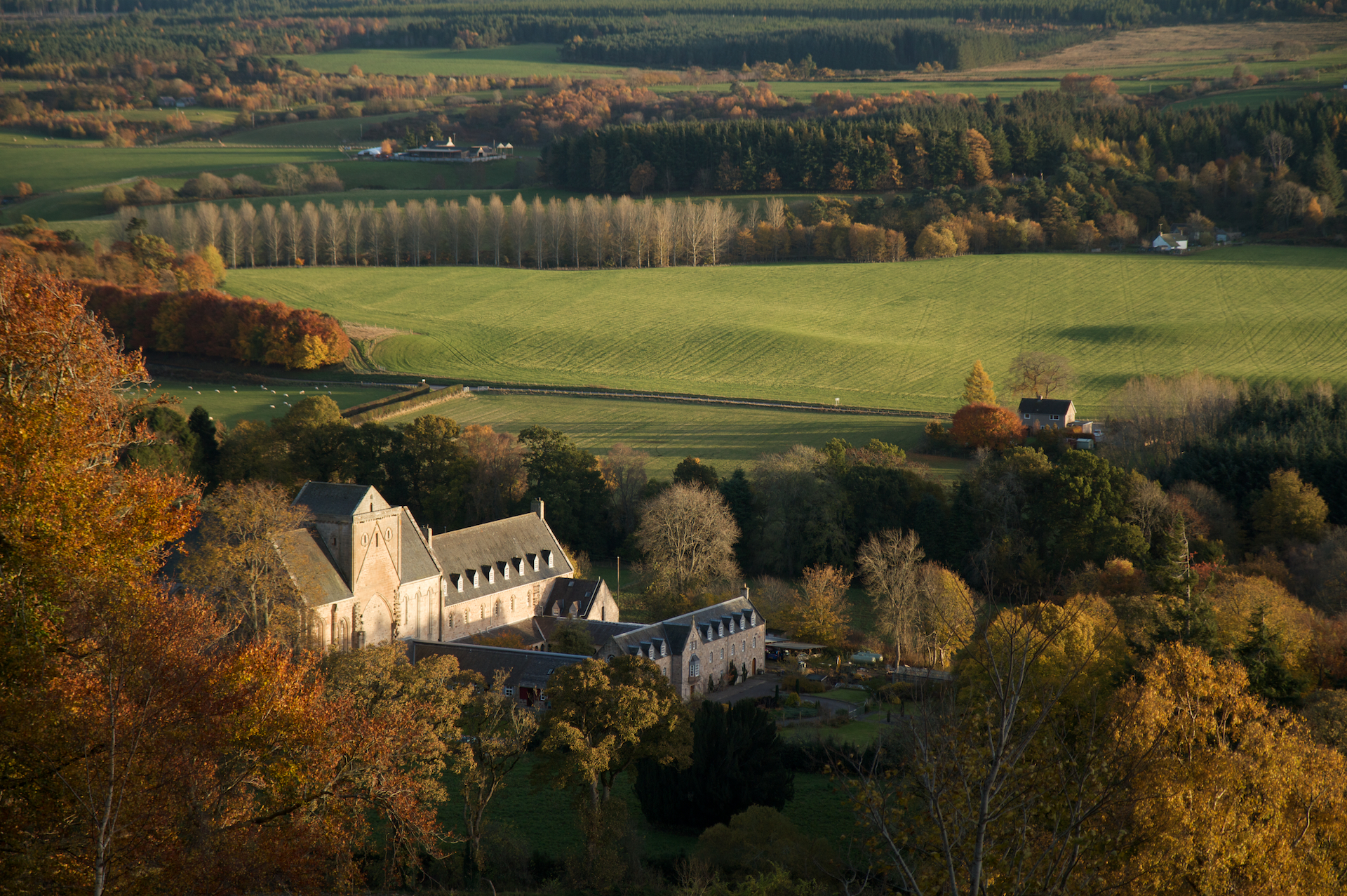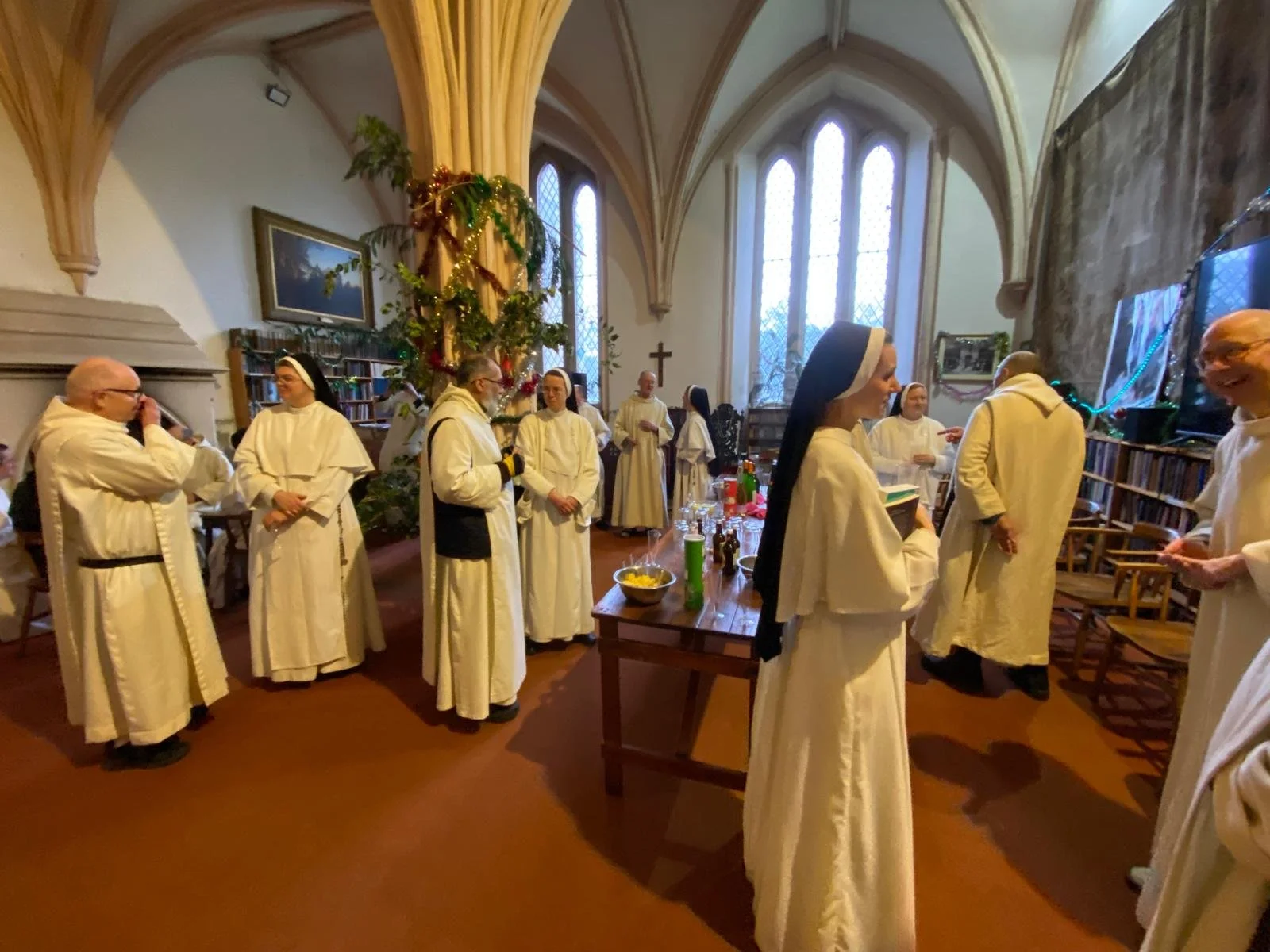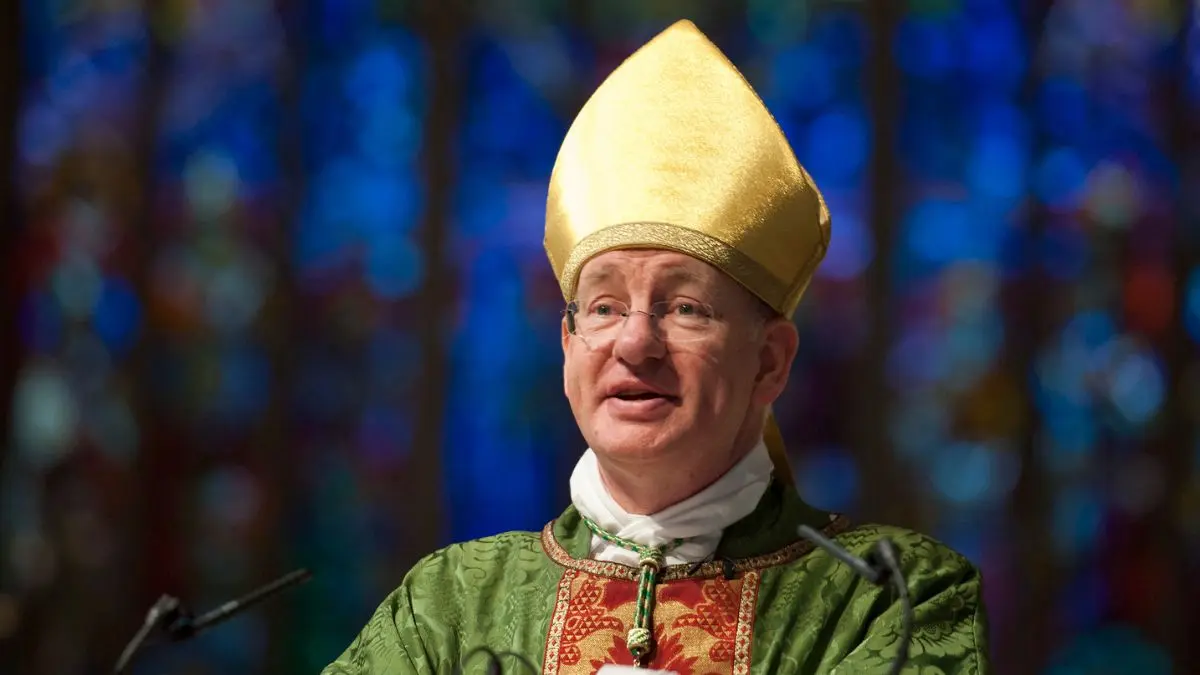Pluscarden Abbey
We are a community of Catholic Benedictine monks living in the only medieval British monastery still being used for its original purpose.
Situated in north-east Scotland, six miles south-west of Elgin in Moray, the monastery enjoys the peace and stillness of a secluded glen, but is easily reached by road from the town. The atmosphere of quiet reflection and of work dedicated to the glory of God is the same now as it was in the thirteenth century, when a community of monks first came to this part of Moray.
If you visit the Abbey today, you can enjoy not only the beauty of its architecture and its setting but also something of the restful atmosphere of devotion that has so deeply permeated this little corner of Scotland. The Mass and full Divine Office are sung by the monks each day in the Abbey church, using Gregorian Chant.
Guests are received in the two guest houses: men and women of all faiths are welcome to make a retreat here and to share in the prayer and work of the community, or simply rest and renew their focus on what is most important.

CHRISTMAS SERVICES AT PLUSCARDEN: DECEMBER 2025 - JANUARY 2026
Sunday 7 December: Ecumenical Carol Service at the Abbey, 6.00 p.m., followed by refreshments.
Wednesday 24 December: Mass at 9.00 a.m. as usual; First Vespers of Christmas at 4.15 p.m.
Solemn Christmas sung Vigils begin at 10.15 p.m.
CHRISTMAS MIDNIGHT MASS BEGINS AT ABOUT MIDNIGHT
Ends maybe about 1.20 a.m.
THURSDAY 25 DECEMBER - CHRISTMAS DAY
An English Mass is said in the Lady Chapel at 8.00 a.m. as usual
Conventual sung Mass (Latin) at 11.00 a.m.
Vespers, Benediction & Compline 4.30 p.m.
Friday 26 & Saturday 27 December: Mass at 10.00 a.m.
Sunday 28 December: The Feast of the Holy Family: Normal Sunday timetable.
THURSDAY 1 JANUARY 2026: MARY MOTHER OF GOD
Mass at 10.00
SUNDAY 4 JANUARY: THE EPIPHANY
Normal Sunday timetable
We have just journeyed through Advent and Christmas – contemplating the mystery of the Incarnation. In a month’s time we will enter the season of Lent as the Church prepares for the central mystery of this year and all years (until the end of time itself) namely that through his Passion Jesus will definitively defeat the power of sin and death and then, after three days, rise from the dead this Easter.
Isaiah 42:1-4,6-7; Acts 10:34-38; Matthew 3:13-17
Today, with the Feast of the Lord’s Baptism, we have the end of Christmas, and the end of the Epiphany. In the West from quite early times a separate Feast of the Baptism fell out of use, being simply absorbed into the Feast of the Epiphany.
The Pluscarden community by custom gathers at noon on the 1st of January for a fraternal exchange of New Year greetings.
This year we invited our Dominican Sisters from Greyfriars Convent Elgin to join us for that.
Isaiah 60:1-6 Ephesians 3:2-6 Matthew 2:1-12
I have a long-standing friend who is a distinguished academic. She has occupied university chairs in several countries, including here in the UK, and published many books and articles. In recent years, the current crisis in academia itself has become one of her main interests. So she has turned her attention to the fate of the University as an established and yet constantly evolving institution in our society.
“Comfort, comfort my people!”
These words of the Lord taken from the Book of Isaiah ring out all through Advent right up to Christmas. There then come several comforting messages, including the following one: “All flesh is grass and all its beauty is like the flower of the field. The grass withers, the flower fades, but the word of our God will stand for ever.”
Isaiah 9:2-7 Titus 2:11-14 Luke 2:1-14
Once upon a time there was “a land of deep darkness”. In fact, it was more like an empire spread over all over the world as we humans know it. Under the “yoke of its burden”, “the rod of the oppressor”, under “the boot of the trampling warrior”, to use the prophet Isaiah's phrases, everyone suffered. All people “walked in darkness”.
The Pluscarden community joins so many others in praying now especially for Richard Moth, recently appointed Archbishop of Westminster.
The quarterly magazine which generally includes a letter from Fr Abbot, a diary of recent activity at the Abbey, book reviews and articles by monks, oblates or visitors.
Are you the one who is to come, or shall we look for another?
This question of St. John the Baptist is a very good one for us to pose as we prepare to celebrate Christmas. If Jesus is not the one - if he is not the promised Messiah of Israel - indeed if he is less than God Incarnate - then we should cancel Christmas, close the monastery, and give up coming to Mass.
Br. John Aidan Cook was buried here at Pluscarden on Saturday 6th December. He was not a monk of our house, though he had spent time trying his vocation with our community in 2018.
Br. John/Aidan had first tried his vocation with the Benedictine monks of Norcia in Italy. While still a Junior, both physically and mentally he found himself unable to continue on there. He came here in 2018 to see if he could live this vocation at Pluscarden.
St Anselm, one of the great medieval champions of the doctrine of the Immaculate Conception, wrote some beautiful prayers addressed to Our Lady. The first of the three included in his famous Prayers and Meditations is spoken from the position of a grave sinner.
Repent, for the Kingdom of heaven is at hand (Mt 3:2).
Once again we hear the cry of St. John the Baptist, always valid, always relevant, always urgent. John calls us to prepare for the coming of the Lord: to know that the Lord is even now among us; to be certain that nothing whatever in our life is more important than knowing him, receiving him, listening to him, following him.
See all news and events
Subscribe for news by email

